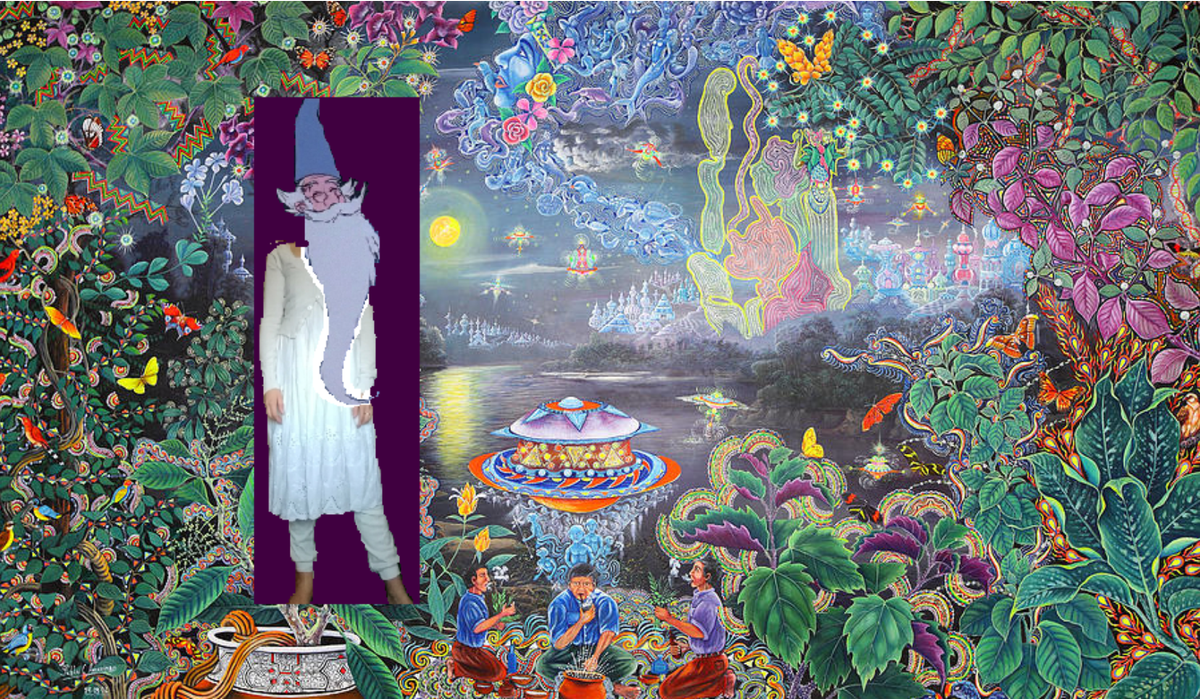YOUR RITUALS AND YOU: Featuring my one-to-one with Mother Ayawaska

By Emrys Lucca
One dim Sunday evening this winter, I stepped out into the city gulping the polluted air with greater relief than ever before. Leaving a building I’d met eight hours ago, I wrapped myself in mother-made garments, feeling a warmth of gratitude all over my skin. I attempted a watery smile at the friend who’d come to escort me home, mocking normality with my uncontrollably widened eyes. By God was I happy to be in that moment.
Minutes before, I was consciously stopping myself from running outside in escape. Having finally exchanged my white clothes for my normal attire, I hurriedly shook a couple of hands and might have managed a smile or two at folks who must have gone on equally mind-warping voyages – but were unnervingly calm. They’d just consumed quite a lot of Ayawaska periodically, a brew containing the same psychedelic ingredients as magic mushrooms, sourced from South American plants. Unlike me, most of the individuals in this bare-footed, mismatched congregation were regulars. In line with the Santo Daime tradition, they had sung in Spanish, danced, and stood segregated according to gender. This was not their first time eagerly chugging down that bitter poison, illegal in most countries across the world.
Contrary to popular bias surrounding ‘drug-use’, the majority of this group were not jobless, hopeless, and certainly not dangerous. They were not distant and desperate, and in fact I felt aware of a normality which I was disturbingly separate from. For these individuals, Daime had become a ritual just like any other in our lives. The image of rituals may be burdened by associations with questionable cults, or misunderstood compulsive behaviour, but rituals are recurring habits we’d be lost without. Either consciously or unconsciously, we define our days by routine and habit, sometimes for the purpose of comfort and reassurance, sometimes for the purpose of intentional growth. Like smoking, drinking, or meditating, the return to this ceremony had become an essential in the lives of these people: an act of grounding, a saving ritual.
But this was not a concept which I could, at that point, process. I’d only just crawled out, barely whole, from my all-too-real ‘journey’. I had lain on an unfamiliar floor with pallid skin and convulsing limbs whilst my mind was a distant traveller in a world of vibrant colour, sound and memory. Like a cruel puppeteer Mother Ayawaska opened curtain after curtain, giving glimpses of scenes that both warmed and stung me. But before long the puppet shows with their bright characters ended. The curtains had closed but the trapdoor had opened beneath me, and I tumbled relentlessly through infinite time loops and layers of discordant realities. A shift in my consciousness occurred – one strived for in this era of ‘Wokeness’; that is, temporary absolution from the Ego. But it wasn’t half as redeeming as I’d thought. As well as being tossed carelessly between planes of reality, I became stripped of my whole sense of self and corresponding memories. I was scared sh*tless. This new nameless consciousness certainly had a level of beauty surrounding it – but it was a level of freedom and detachment that was itself a dreadful entrapment. I scrambled for a semblance of consistency until I was somewhat returned to this ‘true’ reality.
Impatiently awaiting the end of the ceremony, I found myself gazing around at the other children of Mother Ayawaska that Sunday. One bald man who didn’t speak much English was evidently still tripping as we chanted closing prayers around the makeshift altar, his eyes rolling in his head and his body rocking on his feet like a man on a precipice. This had been a ritual of grounding through escapism. Like many of us, I rely on my habits and rituals for continual grounding. And like many of us, my health depends upon this. Mother Ayawaska put me on a cloud far away from the ground – for me, this level of escapism didn’t feel safe, at least not at this time in my life. Nevertheless, I can appreciate the ritual as one which, like all habits, can be useful, reassuring and addictive. So whilst I’m sticking to smoking raspberry leaf, meditating and drinking seven cups of tea a day, I recognise that, for our bald friend, Daime may be a point of touchdown; whether that’s for better or worse is not for me to say.
This is not an endorsement of drug use, smoking, alcohol, or drinking seven cups of tea a day. It is a request that we acknowledge the unique relationships individuals have with ritualistic activities, and a call to harness our own rituals for the sake of our continual and unlimited self-growth.




